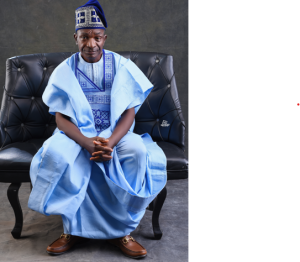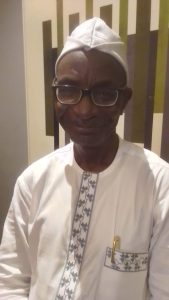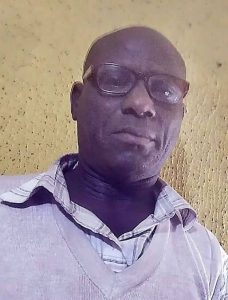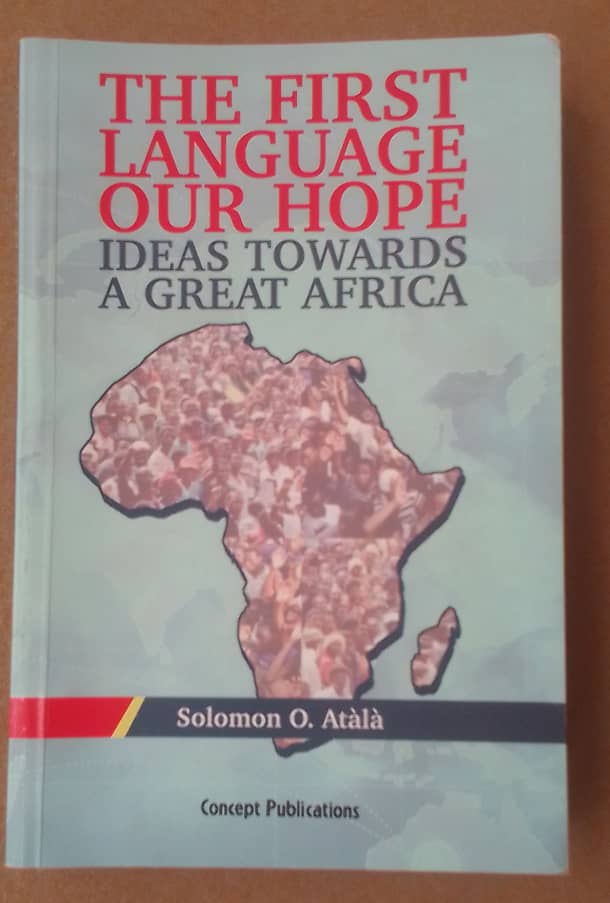Olubunmi Atala’s idea of personal and national development is predicated on the effective use of mother’s tongue as the medium of knowledge dissemination and acquisition.
Ironically Atala is an American trained architect who believes he would have done better if he had learnt architecture in Yoruba instead of English Language
He attended University of Maryland, (UMES) Princess Ann, Maryland in 1975.
He transferred to Howard University, Washington, D.C. in 1976, from where he obtained a Maste’s degree in Architecture in 1980.
However, he is an addict believer in the use of indigenous language as the basis on which Nigeria can get out of its steady educational fall and economic debacle.
In his 368-page book, “The First Language Our Hope; Idea Towards A Great Africa”, Atala posits that Africa remains generally underdeveloped compared with the rest of the world due to its education which is on the wrong pedestal– in foreign languages.
“Africa consumes what other nations produce, and it is not ashamed. Africa begs for loans and aids and other help matters in-spite of its own abundant resources,” he writes.
The book has 22 chapters and details events in politics, religion and economy, comparing Nigeria of the old to the present one and also speaking about the developed economy as a control to the present situation Africa and Nigeria in particular had found itself.
The author is a vast reader as his knowledge of dates of events reflects vividly in his writings, using biblical, traditional and social languages and Yoruba to drive home his points.
“Concerning the construction of the Tower of Babel to reach heaven, my own Bible says: When their language was one, nothing shall be impossible for them. Notwithstanding, their language that got scattered to many languages, “language” remains “language” with its precepts,” he writes.
Quoting him, “In 1997, as a student of the Bible, I read within “The Origin and Growth of the English Bible” in the “Addendum” to my Favorite Bible– Thompson Chain Refence Bible that: the word of Olodumare was locked up in Latin up till 14th century when John Wycliffe saw the rationale, the benefit, in translating the Bible to common English vernacular so that everybody in his country could read and understand deeply the word of God. The Bible was the central text book as of that time. Some of us know the 14th century as the century renaissance era—modernity era – started in Florence, Italy. Renaissance was the birth of the best of earlier civilizations, especially the Greco-Roman ideals. Translations of other books in Greek and Hebrew and Latin were also done to European vernaculars during renaissance.
Other eras that followed Renaissance include: Reformation, Scientific Revolution, the First Industrial Revolution, Agric Revolution, the American and French Revolutions and a General Enlightenment period.
The Second Industrial Revolution (the attainment of Modernity) capped these earlier eras as the Western European countries and America could now produce machines, including automobiles, electricity and steel in place of iron.
Precisely in 1884/ 1885, at the realization of the Second Industrial Revolution, seven European nations sat in Berlin, Germany to impose their languages and cultures on Africa. Their languages have locked up education from majority of our people. That singular act sent Africa back to the Dark Ages which ended in the 15th century. Educate everybody in Africa in the first languages: That means there will no longer be an illiterate person in Africa. And that will impact governance in the communities positively.

Solomon Atala
Providence has a role to play in Atala’s venture in 2019, when he took his manuscript to the English Language Department, UNILAG for assessment. To assess the manuscript, Dr Ayodeji Adedara was recommended by Prof Hope Eghagha, then Head of English Language Department.
They both concluded that Africa is not modern because the continent has not used its first languages in the education of its people as done by others since renaissance. Other people dropped foreign Latin for their own vernaculars since the 14th century.
He said, “As I continued to research on earlier efforts to validate my advocacy, I read about the experiment that Professor Babs Fafunwadid from 1970 to 1978, with some students in now Obafemi Awolowo University, Ile-Ife. His experiment affirmed that students will do better when educated in the mother tongues.

Solomon Atala
(The Author, Solomon Olubunmi Atala)
The last two chapters 20 and 21 of the book, “Language and Culture 1 and Language and Culture 2, according to, Tayo Ogunlewe, a Professor of English, Literature in English and Cultural Studies of the Lagos State University, is a timely and seemingly significant contribution towards the debate and advocacy for mother tongue education.
To him Language is one of human kind’s greatest achievements and one of the most important resources. It is a subject that is endlessly fascinating in itself. Within the range of human experience, the acquisition of language is one of the most conspicuous sensibilities, uniquely characteristic of the species. An awareness of history, the passage of time and experience, becomes the for the human community the mechanism where we define ourselves, looking to our past for a self authenticating sense of purpose and direction and then, in turn, looking to our future with resolve and determination.
More properly put, it is a call, loud and emphatic for a recognition of, not just the mother tongue but for a re-appraisal of the value and the need for better recognition and valuation of indigenous African and valuation of indigenous African knowledge systems. The term indigenous may appear problematic because it appears to collectivize many district populations whose experiences under colonialism have been somewhat different, probably vastly so. Other collective terms akin to or synonymous to it include “Native”, “First people”, “Aboriginals and quite a few others. While not denying the very powerful worldviews embedded in such terms, within my own intellectual framework in this review I intend to implicate or privilege the term “Mother Tongue”. And “Indigenous”.

Professor Tayo Ogunlewe
A book like this is long overdue, it is entitled: The first Language, Our Hope: Ideas towards a Great Africa
It will be most useful for mother-tongue or first language activists, indigenous knowledge systems advocates, linguistics scholars, educational policy planners and the general public.
The author is oddly enough an architect rather than (as one would ordinarily presume) a languish, a literary theorist or an educationist or probably a social activist.
The basic or fundamental position and advocacy in this book is that Africa and Africans, the continent and its peoples, must endeavour to return their first languages, native languages and mother tongues to its place of honour in their societies. Indigenous languages should be not only be given pride of place, but elevated to prominence across all levels of our education structure/systems and even governances. What does this mean? It simply means that society, our society should belong to us. Yorubas should be taught in Yoruba. Children in Yorubaland ought to be able to learn arithmetic, physics, chemistry, Shakespeare etc in Yoruba. Ditto for Ibo Children, Ewe children, Ashanti, Zulu, Masai etc in their respective homelands and societies. Despite the imposition of English, French, Portuguese and Arabic by Imperialists and Colonizers and the subsequent unthinking adoption and celebration of these foreign tongues on the indigenous populations in Africa, or maybe inspite of it, African governments and social/educational policy makers should strive to become more historically aware and politically conscious to the nuances of intellectual slavery in the 21st century and in this increasingly multicultural world.
The book in its 22 chapters gives a sweeping overview of stories, values, practices/struggles, examples and ways of knowing which continue to inform indigenous pedagogies and experiences. The opening, from the prologue to chapter 7 gives the author’s perspectives on the Nigerian and American Constitutions, leadership styles in comparison, interrogating the merits and demerits of each approach.
Chapters 8-15 explores societal consciousness, values, faith and liberty using biographical commentaries on notable African patriots like Nelson Mandela, Wole Soyinka, Fela Kuti and Tai Solarin as icons of the struggle to emancipate and decolonize the African consciousness for a repossession of Africa by Africans. Chapters 16 and 17 calls for the political will by African governments and its elites, using the Nigerian context as example, for a return to regionalism as opposed to the present unitary arrangement that blatantly refuses to acknowledge the peculiarities and differences of the various and different ethnolinguistic groups. Personally, I am of the opinion that moving a contraption in which over 400 diverse linguistic ethnicities and cultures who do not share the same vision and thus cannot have the same mission is an exercise in futility.
A major reason why the country with all its vaunted resources is in a state of stagnation since independence. Productivity and ingenuity are two sides of the same coin. As the old saying avers “Necessity is the mother of invention”. For productivity, enthusiasm is key.
Nigeria has been stagnant in very many key areas and talk has been long while action has been short.
Chapters 18-21 examine the roles of education, language and culture in an increasingly competitive world. In the 19th Chapter, the author took time out to note the place of utilization and maximization of resources including business ideas and practices viz a viz the quality of education in any given society. The USA was the preferred example, and finally, the Epilogue where the author’s advocacy of the mother tongue or native language is further emphasized in rounding off his philosophical odyssey on the best way by which Africa may achieve greatness and Africans achieve respectability among other achievers on the universal stage.
To further affirm his passion for his agenda of promoting mother tongue education, indigenous knowledge systems and unity, Solomon Atala has gone on to” put his money where his mouth is by translating his effort into Yoruba, his first language, complete with a bibliography and a glossary to probably to satisfy academic nitpicks and establish his scholarship.


